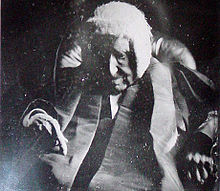Martin Routh
Martin Joseph Routh (* 18th September 1755 in South Elmham , Suffolk , † 22. December 1854 ) was an English scholar, theologian and for 63 years president of Magdalen College of the University of Oxford . He was particularly concerned with the Church Fathers .
Life
Routh's father was the principal of South Elmham. Martin was the oldest of 13 children. From 1770 he studied at Queen's College in Oxford, but moved to Magdalen College a year later, graduating in 1774. In 1775 Routh became a Fellow of Magdalen College. He became a Deacon in 1777, but let over 30 years elapse before he was ordained a priest in 1810 on the occasion of his appointment as rector in Tilehurst near Reading, where he later regularly spent the university holidays. As a reason he gave his preoccupation with his main work Reliquae sacrae . In 1781 he became tutor to Edward South Thurlow, who came from an influential family. In 1781 he became a librarian at his college, 1784/85 Junior Dean of Arts and 1786 bursar of his college. In 1785 he became Senior Proctor at Oxford University. In 1791 he became President of Magdalen College, Oxford, which he remained until 1854. He did not seek higher offices at the university or in the church.
The first two volumes of his main work on the writings of the lesser-known church fathers of the 2nd and 3rd centuries (Reliquae sacrae) appeared in 1814, two further volumes in 1815 and 1818. In 1848 he published a revised edition with an additional volume. He was active until his death and published in 1848, over a period of 70 years.
His sister ran the household for him until they married. In 1820 he married Eliza Agnes Balgrave (1790–1869), 35 years his junior. The marriage was happy. He is said to have been the last to wear a wig in Oxford and he always wore his cassock.
Routh edited the history of Bishop Gilbert Burnet ( History of my own time ) and in 1784 published an edition of Euthydemos and Gorgias of Plato .
An avid book collector, Routh left behind a library of 16,000 volumes on his death (200 of which were not in the Bodleian Library). He offered it to Queen's College on the condition that it could continue to be used until his death. When this refused, he bequeathed his library to the University of Durham .
In 1783 he advised an embassy of the American Anglican Church, which did not yet have its own bishops, not to request episcopal succession from the Danish Lutheran Church , but from the Scottish Episcopal Church . Until then, priests had to come to England for formation and ordination, which proved to be a major obstacle (many did not return or died). Episcopal ordinations by bishops of the Church of England were out of the question, because there every candidate had to take the oath of ecclesiastical supremacy of the King of England . In 1784 Samuel Seabury from Connecticut was ordained a bishop by the Bishop of Aberdeen.
He was on good terms with John Henry Newman , who dedicated his book Lectures on the Prophetical Office of the Church (1837) to him as the person who taught the theology of their fathers to a forgetful generation .
Fonts (selection)
- Reliquae sacrae sive auctorum fere jam perditorum secundi tertiique seculi post Christum natum quæ supersunt , 4 volumes, Oxford 1814, 1815, 1818, 2nd edition 1848 (5 volumes), Volume 1 , Volume 2 , Volume 3 , Volume 4 , Volume 5, Archives
- Scriptorum Ecclesiasticorum Opuscula praecipua quaedam , 2 volumes, Oxford 1832, 2nd edition 1840, volume 1 , volume 2
- Platonis Euthydemus et Gorgias , Oxford 1784, Archives
literature
- Vivian HH Green: Routh, Martin Joseph (1755-1854), Oxford Dictionary of National Biography , Online 2004
Web links
Individual evidence
| personal data | |
|---|---|
| SURNAME | Routh, Martin |
| ALTERNATIVE NAMES | Routh, Martin Joseph |
| BRIEF DESCRIPTION | English theologian and scholar |
| DATE OF BIRTH | September 18, 1755 |
| PLACE OF BIRTH | South Elmham |
| DATE OF DEATH | December 22, 1854 |
